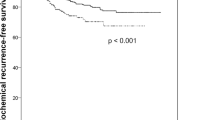Abstract
Objectives
To determine if elevated markers of poor glycemic control (HgA1c and fasting glucose levels) in patients surgically staged for type I endometrial cancer is related to a higher stage or higher grade at the time of diagnosis. Also, to assess if these markers impact overall survival.
Methods
A retrospective chart review was performed from January 2000 to June 2010 at three academic medical centers. Patients were included if they underwent surgical staging and had HgA1c drawn within 3 months before surgery. Demographic data, fasting blood glucose levels and overall survival data were also obtained.
Results
Eighty-two patients fitting the inclusion criteria were identified during the study period. There was a strong positive correlation between HgA1c and fasting glucose. There was no statistical difference with regard to stage alone, grade alone, or when stratified together with regard to HgA1c or fasting glucose levels. There was a trend toward increased mean HgA1c across increasing stages, but this was not statistically significant. Diabetes, HgA1c and tumor grade did not affect overall survival, but advanced stage was a poor prognostic measure for overall survival.
Conclusions
Elevated preoperative HgA1c has a trend toward a higher stage at the time of diagnosis. Advanced stage is a poor prognostic measure for overall survival.

Similar content being viewed by others
References
Cancer facts and figures, 2011. www.cancer.org
Naumann RW (2008) Uterine papillary serous carcinoma: state of the state. Curr Oncol Rep 10:505–511
Bokhman JV (1983) Two pathogenetic types of endometrial carcinoma. Gynecol Oncol 15:10–17
Lin J, Ridker PM, Pradhan A et al (2005) Hemoglobin A1c concentrations and risk of colorectal cancer in women. Cancer Epidemiol Biomarkers Prev 14(12):3010–3012
Lin J, Ridker PM, Rifai N et al (2006) A prospective study of hemoglobin A1c concentrations and risk of breast cancer in women. Cancer Res 66(5):2869–2875
Becker S, Dossus L, Kaaks R (2009) Obesity related hyperinsulinemia and hyperglycaemia and cancer development. Arch Physiol Biochem 115(2):86–96
Travier N, Jeffreys M, Brewer N et al (2007) Association between glycosylated hemoglobin and cancer risk: a New Zealand linkage study. Ann Oncol 18:1414–1419
Siddiqui AA, Spechler SJ, Huerta S et al (2008) Elevated HbA1c is an independent predictor of aggressive clinical behavior in patients with colorectal cancer: a case–control study. Dig Dis Sci 53(9):2486–2494
Siddiqui AA, Maddur H, Naik S et al (2008) The association of elevated HbA1c on the behavior of adenomatous polyps in patients with type-II diabetes mellitus. Dig Dis Sci 54(4):1042–1047
Saydah SH, Plantz EA, Rifai N et al (2003) Association of markers of insulin and glucose control with subsequent colorectal cancer risk. Cancer Epidemiol Biomarkers Prev 12:412–418
Rinaldi S, Rohrmann S, Jenab M et al (2008) Glycosylated hemoglobin and risk of colorectal cancer in men and women, the European prospective investigation into cancer and nutrition. Cancer Epidemiol Biomarkers Prev 17(11):3108–3115
Levran D, Modan M, Menczer J et al (1984) Increased rate of glucose intolerance in endometrial cancer—a community-based study. Gynecol Obstet Invest 18(4):190–193
Folsom AR, Anderson KE, Sweeney C et al (2004) Diabetes as a risk factor for death following endometrial cancer. Gynecol Oncol 94:740–745
Ludwig H (1995) Prognostic factors in endometrial cancer. Int J Gynecol Obstet 49S:S1–S7
Conflict of interest
None.
Author information
Authors and Affiliations
Corresponding author
Rights and permissions
About this article
Cite this article
Stevens, E.E., Yu, S., Van Sise, M. et al. Hemoglobin A1c and the relationship to stage and grade of endometrial cancer. Arch Gynecol Obstet 286, 1507–1512 (2012). https://doi.org/10.1007/s00404-012-2455-7
Received:
Accepted:
Published:
Issue Date:
DOI: https://doi.org/10.1007/s00404-012-2455-7




